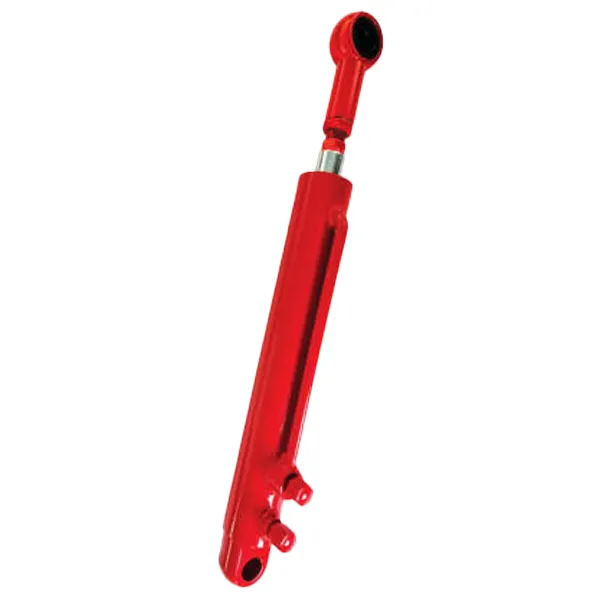How Do You Tell If a Hydraulic Cylinder is Bad?
2025-11-04
Hydraulic cylinders are vital components in many machines and industrial systems, serving to transmit force and motion. However, just like any mechanical part, hydraulic cylinders can wear out over time. As a team at RADAFON, we understand the significance of keeping your equipment running smoothly, and that’s why we’re here to help you identify when your hydraulic cylinder might be failing.
If you’ve noticed any strange behavior or performance issues in your machinery, you may be wondering, "How do you tell if a hydraulic cylinder is bad?" Let’s dive into the signs that indicate a potential problem and how to troubleshoot it before it turns into a costly repair.
What Are the Common Signs That Indicate a Hydraulic Cylinder Is Failing?
-
Leaking Fluid
-
One of the most common signs of a failing hydraulic cylinder is visible fluid leaks. If you notice any oil around the cylinder’s seals or hoses, it's a red flag. Leaks can cause reduced pressure, leading to poor performance and potentially damaging other parts of the system.
-
-
Sluggish or Unresponsive Movement
-
If your hydraulic cylinder is moving slowly or not at all, it could be an indication of internal damage or contamination. This could result from worn seals, a blocked passage, or insufficient fluid levels.
-
-
Uneven or Jerky Movements
-
When a hydraulic cylinder begins to move erratically, you may experience uneven or jerky motion. This might mean that internal components such as the piston or rod are damaged, causing an inconsistent flow of hydraulic fluid.
-
-
Excessive Noise
-
Unusual noises like grinding, rattling, or whistling could point to internal wear or air bubbles trapped in the hydraulic fluid. If you hear these sounds, it's time to inspect the system closely.
-
-
Rod Damage or Scratches
-
Physical damage to the rod can also signal a problem. If the rod shows scratches, dents, or signs of corrosion, it can lead to seal failure, contamination, and eventual cylinder malfunction.
-
-
Overheating
-
A hydraulic cylinder that becomes excessively hot could indicate poor lubrication or high fluid pressure, both of which can cause long-term damage. Overheating can also be caused by a clogged cooling system or contaminated fluid.
-
How Do You Inspect a Hydraulic Cylinder for Damage?
Inspecting your hydraulic cylinder regularly can help prevent failures and costly downtime. Here are a few steps to follow:
| Inspection Task | Description | How to Perform |
|---|---|---|
| Check for Leaks | Look for any signs of fluid around the cylinder or seals. | Visually inspect seals and connections. |
| Monitor Movement | Ensure the cylinder moves smoothly and consistently. | Operate the equipment and observe. |
| Inspect for Noise | Listen for any abnormal sounds during operation. | Run the equipment and listen closely. |
| Examine the Rod | Look for any physical damage such as scratches or bends. | Clean the rod and inspect for wear. |
| Assess Fluid Temperature | Ensure the fluid temperature stays within optimal ranges. | Use a temperature gauge to monitor. |
Why Does a Hydraulic Cylinder Fail?
There are several reasons why a hydraulic cylinder might fail prematurely. Some of the most common causes include:
-
Wear and Tear: Over time, the internal components of a hydraulic cylinder wear down, particularly seals and pistons, which can lead to leaks or performance issues.
-
Contamination: Dirt, debris, or water entering the hydraulic fluid can cause blockages, seal damage, and system failure.
-
Improper Maintenance: Lack of routine maintenance, such as checking fluid levels or replacing worn seals, can shorten the life of your hydraulic cylinder.
-
Overloading: If the cylinder is subjected to forces greater than its designed capacity, it can lead to catastrophic failure.
What Should You Do If You Suspect a Hydraulic Cylinder is Bad?
If you notice any of the signs mentioned above, it’s crucial to address the issue immediately to prevent further damage. Here’s what you should do:
-
Stop Operation: If the hydraulic cylinder is showing signs of failure, stop using the equipment to prevent further damage to the cylinder or other components.
-
Check Fluid Levels: Ensure that the hydraulic fluid is at the correct level and hasn’t become contaminated.
-
Inspect for Leaks: Look for visible leaks or signs of fluid loss around the seals and connections.
-
Contact a Professional: If you're unsure about the cause of the problem, it’s best to contact a professional service provider who specializes in hydraulic cylinder repairs and maintenance.
At RADAFON, we offer expert services for diagnosing, repairing, and maintaining hydraulic cylinders. If you’ve noticed any issues with your equipment, don’t wait until the problem worsens—reach out to us today.
How Can RADAFON Help You with Hydraulic Cylinder Issues?
We understand the critical role hydraulic cylinders play in your machinery, and we’re here to provide expert solutions tailored to your needs. Whether you need an inspection, repair, or replacement, our team at RADAFON is ready to assist. Don’t let a bad hydraulic cylinder affect your operations—contact us today to schedule a consultation or get more information.
Ready to Solve Your Hydraulic Cylinder Issues?
If you’re experiencing problems with your hydraulic cylinders or have any questions, don’t hesitate to contact us. Our experienced team is here to help you get back to work with minimal downtime. Let’s keep your equipment running smoothly!
